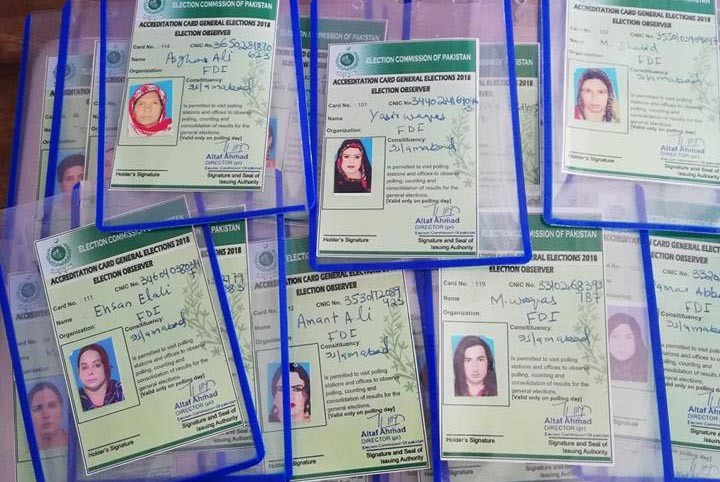
The 2018 elections have given transgenders hope for a better and more active role in the country’s electoral process

"A time will come when we will get elected, and work for the betterment of awaam [public]. We don’t have kids of our own so we will work for the safety of children of other people," Nadeem Kashish, a transgender who contested NA-53, said while appearing on a tv show, Sawal Ye Hai, aired on August 11, 2018.
Five trans people contested the July 25 general elections -- Nadeem Kashish, along with Resham and Nayyab Ali, ran for National Assembly seats, while Lubna Ali and Maria Khan contested provincial assembly seats.
In the 2013 general elections, a number of trans persons had also run for provincial assembly seats.
Over the past few years, some non-government organisations (NGOs) have invested time and effort in strengthening transgender rights. They have held sensitisation trainings for parliamentarians, and have worked tirelessly to raise them to the status of equal citizens. Perhaps, trans peoples’ participation in the recent elections is an outcome of NGO’s concrete efforts.
Section 48-A of the Election Reforms Act 2017 that ensures right to vote for women, persons with disabilities, religious minorities and trans people further encouraged them to participate in the electoral process.
Despite an increase in application charges to contest elections, five transgender candidates ran the elections, and bagged a total of 1,280 votes -- in NA-53, Nadeem Zafar Khan (Nadeem Kashish) polled 22 votes as an independent candidate; in NA-69, Zahid Khan (Resham) got 305 votes as an independent candidate; in NA-142, Muhammad Arsalan (Nayyab Ali) bagged 197 votes as a Pakistan Tehreek-e-Insaf-Gulalai (PTI-G) candidate.
Babar Mujahid (Lubna Ali) from PP-26 polled 220 votes as a PTI-G candidate; Alamgir Khan (Maria Khan) from PK-31 got 536 votes as an independent candidate. Initially 13 of them were in the run, however, eight boycotted the elections, as the ECP nomination papers did not have a separate column for transgender persons. Those who did classified themselves as male. A few of them were short of funds required to fight elections.
For the first time in the 2018 elections, 25 trans persons were appointed polling observers in the capital of each province.
Despite such positive changes this election, a number of challenges pertaining to transgender rights need to be addressed.
According to an ECP report, a total of 105.96 million voters were registered for the 2018 elections, out of which 59.22 million were male (55.9 per cent) and 46.73 million (44.1 per cent) were females. Transgender persons are not counted.
"The Gender and Disability Electoral Group of the ECP has 2,000 registered transgender persons, yet they were not included in the total count of voters," says Uzma Yaqoob of Forum of Dignity Initiative.
Lack of education, awareness and trust in the electoral system led the trans community to refrain from casting votes on the election day.
"There were very few trans voters on the election day. They did not face any problems, rather the staff was very welcoming," says Zainy, an election observer representing Khawaja Sira Society Lahore. More importantly, she adds, "Some of us wanted to vote in the female section of the polling station but were not allowed to, as our CNICs classified us as male."
Julie, a transgender observer working with Forum of Dignity Initiatives in Islamabad says, "We did not face any issues with the security deployed. Some people did pass comments on us but nothing violent happened. Rather, transgenders considered it a day of celebration as they were observers for the first time in elections."
"Many trans persons did not vote as they do not have CNICs," says Julie. Trans persons face problems in acquiring CNICs due to the requirement of filling in parents’ names and permanent address. Trans persons avoid going back to their homes that they left years ago to cast votes. It is unfortunate that in the 2017 census only about 10,000 trans persons were counted in Pakistan, when the figure is estimated to be much higher.
A common complaint expressed by transgenders was that they were unfamiliar with the candidates as they were using their male names to contest elections, except Maria Khan from PK-31, who has her male and female name on her CNIC as her family has accepted her. If things had worked in time then a third gender box would have been made for trans persons and they could have had their female name in it.
Nayyab Ali discloses that political parties’ supporters threatened her during her election campaigns. The district administration provided her security just three days before the election day. "Polling agents were not allowed to enter the polling room even though they were given proper CNICs. But we will not back out. We will contest the local government elections better prepared."
Uzma Yaqoob says, "This is just the first step. A day will come when transgender will reach national and provincial assemblies and work for everyone in Pakistan, not particularly their own community. Over all, the trans community is happy with the electoral process."